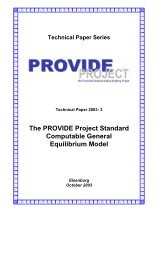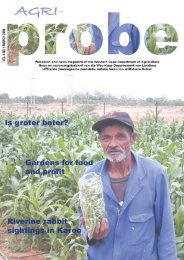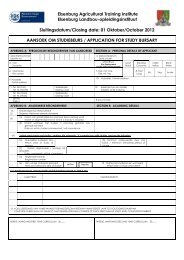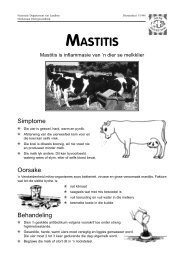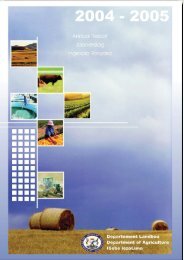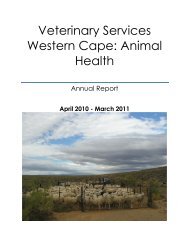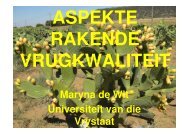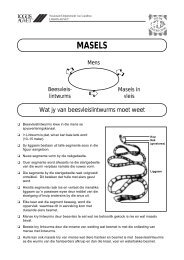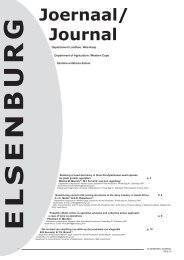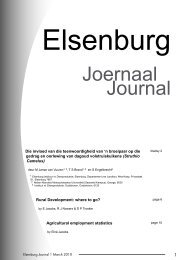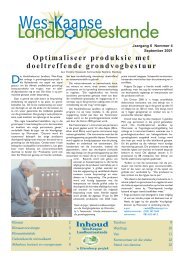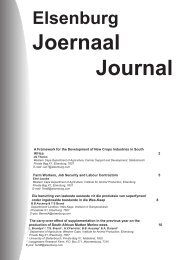honey bush tea - Department of Agriculture: Western Cape
honey bush tea - Department of Agriculture: Western Cape
honey bush tea - Department of Agriculture: Western Cape
You also want an ePaper? Increase the reach of your titles
YUMPU automatically turns print PDFs into web optimized ePapers that Google loves.
understanding <strong>of</strong> production costs and returns studies, and assessments <strong>of</strong> market<br />
trends.<br />
With this information altogether we would have a more total package <strong>of</strong> information to<br />
inform the decision-making <strong>of</strong> small and large-scale operators. Market related issues<br />
and production costs and return information are among the top issues identified by the<br />
industry. These issues are particularly critical for new or specialty crops, because<br />
unlike other well-established commodities, information is limited at its best. Hence, the<br />
South African Honey<strong>bush</strong> Tea Association requested the <strong>Department</strong> <strong>of</strong> <strong>Agriculture</strong> to<br />
conduct a study on the economic analysis <strong>of</strong> <strong>honey</strong><strong>bush</strong> <strong>tea</strong>.<br />
The study will give a brief overview <strong>of</strong> the black <strong>tea</strong> market focusing on both demand<br />
and supply issues. The reason being that although <strong>honey</strong><strong>bush</strong> is a health <strong>tea</strong>, it still<br />
faces competition from other <strong>tea</strong>s that serve a similar purpose and hence trends<br />
particularly in the black <strong>tea</strong> market are <strong>of</strong> importance. As new products are being<br />
introduced and more competition arises, pr<strong>of</strong>it margins will be affected. Thus, there is<br />
increasing need to study the economic efficiency <strong>of</strong> <strong>honey</strong><strong>bush</strong>. For this purpose, a<br />
number <strong>of</strong> farm management tools such as gross and net margins are used in this<br />
study.<br />
An effort will also be made to compare different species <strong>of</strong> <strong>honey</strong><strong>bush</strong> and farming<br />
practices i.e. small and commercial scales). However, it should be noted that the study<br />
is not meant to be comprehensive, but should be taken as a contribution or a<br />
background to the analysis <strong>of</strong> the entrepreneur who has the opportunity and or want to<br />
invest in the <strong>honey</strong><strong>bush</strong> industry.<br />
1.2 Product Description and Benefits<br />
All <strong>honey</strong><strong>bush</strong> <strong>tea</strong>s are derived from one plant, Cyclopia spp. It is the region <strong>of</strong> origin<br />
that mainly determines the variety. “Heuningtee, Bergtee, Boertee, Bossiestee,<br />
Bush<strong>tea</strong>” are some <strong>of</strong> the many names the <strong>tea</strong> is called. The indigenous shrub,<br />
belonging to the <strong>Cape</strong> fynbos biome, grows in the coastal districts <strong>of</strong> the <strong>Western</strong> and<br />
Eastern <strong>Cape</strong> Provinces, from Darling to Port Elizabeth, being bounded on the north by<br />
the Cederberg, Koue Bokkeveld, Klein Swartberg, Groot Swartberg and Kouga<br />
2



